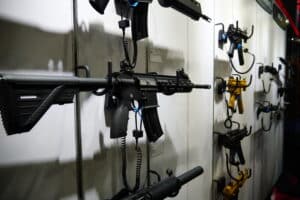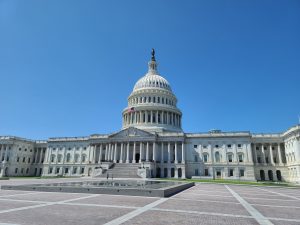We have a bit of breaking news to start off this week’s members’ newsletter. The so-called ghost gun ban was just dealt a serious blow in federal court.
Judge Reed O’Connor granted a preliminary injunction against the ATF’s rule to Defense Distributed and its customers. While not a total elimination of the rule, it’s pretty close to it as trying to charge anyone with violating the rule becomes much more difficult in practice whether or not they’re covered directly by the ruling. After all, the injunction was only issued because the judge believes the rule itself is likely to lose on the merits.
That leaves President Biden’s executive actions on guns hanging by a thread. His redefinition of “firearm” to give ATF power over regulating unfinished and unserialized gun parts has been neutered. And, as I explain in my members’ piece below, his pistol-brace ban is next on the chopping block.
This week also saw the unveiling of a permit process in one California city that costs north of $1,000. That got me wondering how the rest of the deep blue areas forced into issuing a significant number of permits for the first time are pricing their applications, especially since this will probably be a hot spot that sparks new legal flames. Contributing Writer Jake Fogleman answers that question with a thorough look at how each impacted state has handled things.
Plus, National Review’s Charles Cooke joins the podcast to talk about how Florida’s gun reforms affect Ron Desantis and the Republican presidential primary.
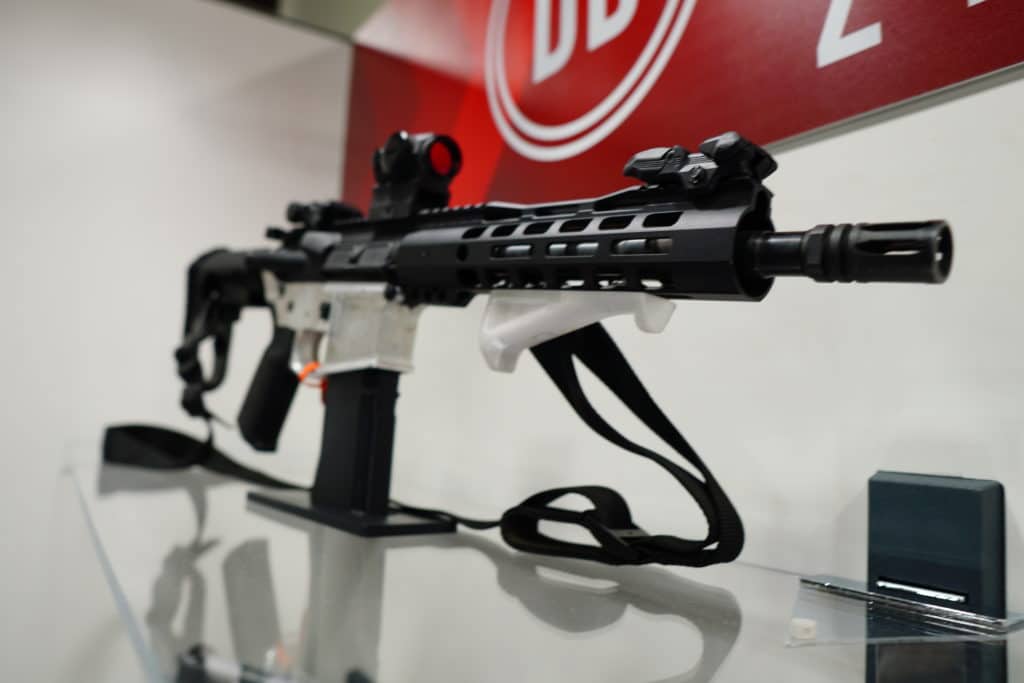
Federal Judge Expands Block on Biden ‘Ghost Gun’ Ban
By Stephen Gutowski
The ATF can no longer enforce its unfinished-gun-parts ban against one of the foremost makers of homemade firearm kits.
Judge Reed O’Connor of the U.S. District Court for the Northern District of Texas, a George W. Bush appointee, issued a preliminary injunction on Thursday extending protections against the government’s new regulations on homemade gun parts to Defense Distributed. The ATF can no longer implement its rule in regard to the company or its customers. The judge found those rules, proposed at the request of President Joe Biden (D.), are likely unconstitutional and cause an undue burden on the parts maker.
Judge O’Connor wrote in VanDerStok v. Garland that “[t]he Government’s likely ultra vires enforcement efforts upset decades of ATF regulatory precedent against a public that has relied on that historic posture” and “the liberty interests of law-abiding citizens wishing to engage in historically lawful conduct (dealing in now-regulated parts)—which Defense Distributed shares—outweighs the Government’s competing interest in preventing prohibited persons from unlawfully possessing firearms.”
The decision adds the company, which has been at the forefront of 3D-printed, home-machined gun designs, and litigation over both for years, to a small list of other manufacturers that O’Connor has exempted from the rule. While a different federal judge previously denied an attempt by gun-rights advocates and Republican Attorneys General to have the rule blocked on Second Amendment grounds, Judge O’Connor has found Defense Distributed and the Second Amendment Foundation’s argument the ATF overstepped its authority under the Administrative Procedure Act (APA).
The ruling is another blow to President Biden’s efforts to unilaterally tighten gun regulations through ATF rulemaking rather than legislation. It comes just a few weeks after the Fifth Circuit Court of Appeals ruled the agency’s bump-stock ban violated the APA. Both decisions foreshadow potential legal troubles for Biden’s other major gun rule: the pistol-brace ban.
Judge O’Connor’s ruling adds to the split among judges over whether the government can ban or severely restrict home making of firearms either by banning the practice outright or trying to prevent unfinished parts from being sold. A federal judge in California upheld the state’s “ghost gun” ban in October. But that came after another federal judge ruled Delaware’s ban violates the Second Amendment in September.
In VanDerStok, Judge O’Connor found that the ATF didn’t have the authority to ban the products Defense Distributed sells and the agency’s rule needed to be blocked immediately to prevent the company from going out of business.
“Defense Distributed has shown that it is likely to suffer irreparable harm—through unrecoverable lost revenues and, potentially, eventual total dissolution of its business—if the Court does not provide injunctive relief while litigation is ongoing,” he wrote. “Solely in response to the Final Rule, Defense Distributed avers it ceased dealing in unfinished frames, unfinished receivers, and frame and receiver parts kits out of fear of violating the new regulation. That this fear was well-founded was later confirmed by ATF’s Open Letter identifying certain types of partially manufactured, frames, receivers, and parts kits as ‘firearms’ for purposes of the [Gun Control Act].”
Judge O’Connor ruled against SAF’s claim in the case. He found the gun-rights group itself was not irreparably harmed by the ATF’s rule because its members were still able to buy unfinished gun parts from the two other companies, Tactical Machining, LLC and BlackHawk Manufacturing Group Inc., that he previously granted injunctions for. Still, SAF founder Alan Gottlieb described the preliminary injunction as a “huge victory”
“Judge O’Connor agrees that ATF’s final rule expanded the agency’s authority over parts that may be ‘readily converted’ into frames or receivers, which surpasses the authority granted by Congress,” Adam Kraut, SAF’s executive director, said in a statement. “Even more compelling is that the judge agrees that ATF’s rule unlawfully treats parts kits as firearms. It is refreshing to see rogue administrative agencies being reined in by the checks and balances of our system of government.”
In a blog post on their site, Defense Distributed said their win was a defeat not just for the Biden Administration but also their allies in the gun-control movement.
“This is not just a blow to ATF, who pushed a new definition of ‘firearm’ at their peril,” the company said. “It is also a defeat for Giffords, who were the agents of this illegal attempt to expand the Gun Control Act through the APA process. Their lobbying and regulatory laundry has now spectacularly backfired, and I’m going to personally send them a card and fruit basket.”
Neither the Department of Justice, which oversees the ATF, nor Giffords responded to a request for comment.
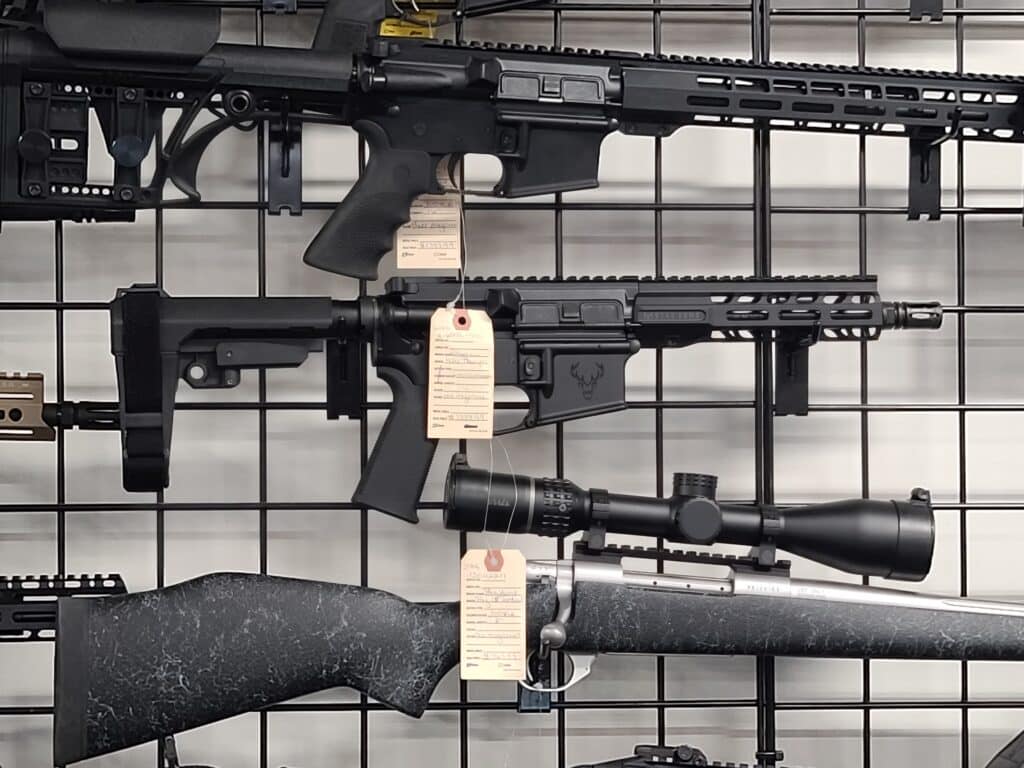
Analysis: Ruling Against ‘Ghost Gun’ Ban Another Bad Sign for the Pistol Brace Ban [Member Exclusive]
By Stephen Gutowski
President Biden’s efforts to enact new gun restrictions are failing, and it’s only likely to get worse for him from here.
On Thursday, federal district judge Reed O’Connor exempted Defense Distributed and its customers from the ATF’s new rule banning the sale of most unserialized gun kits and unfinished gun parts. Given the company’s position as a leader in the space, the ruling makes enforcement of the ban against anyone far more difficult. And it darkens the shadow already cast over the legal prospects of Biden’s other unilateral gun restriction: the pistol-brace ban.
Judge O’Connor found the ATF exceeded its statutory authority under the Administrative Procedure Act (APA) when it decided to reinterpret what constitutes a “firearm” after several decades in an effort to shut down the sale of unfinished parts and homemade gun kits. While it doesn’t directly mention it, the ruling is rooted in the same logic the Fifth Circuit Court of Appeals used to strike down the ATF’s bump stock ban in January. And it is difficult to see how the agency’s pistol brace rule won’t meet the same fate.
Judge O’Connor wrote in VanDerStok v. Garland that “[t]he Government’s likely ultra vires enforcement efforts upset decades of ATF regulatory precedent against a public that has relied on that historic posture” and “the liberty interests of law-abiding citizens wishing to engage in historically lawful conduct (dealing in now-regulated parts)—which Defense Distributed shares—outweighs the Government’s competing interest in preventing prohibited persons from unlawfully possessing firearms.”
Interestingly, none of this is due to the Supreme Court’s landmark ruling in New York State Rifle and Pistol Association v. Bruen. In fact, these cases don’t even deal with the Second Amendment. Nor do they deal with the Supreme Court’s decision on how regulators have to operate in West Virginia v EPA.
At least not directly. The Court turning a more skeptical eye to significant regulatory revisions that happen without explicit congressional direction as well as gun restrictions, may be playing a subtle role. But that influence hasn’t translated into the written text of the opinions in these cases.
Instead, these rulings have hinged on the limited reach of the ATF and the inconsistent way it has pursued regulation in each area. The agency’s repeated insistence that a product or practice was legal for years only to turn around and decide it no longer is, at the direction of a president and without a new legislative mandate, has proved fatal for its efforts to enforce its new rules.
“As an initial matter, it purports to allow ATF—rather than Congress—to set forth the scope of criminal prohibitions,” Judge Jennifer Walker Elrod wrote for the majority in Cargill v. Garland. “Indeed, the Government would outlaw bump stocks by administrative fiat even though the very same agency routinely interpreted the ban on machineguns as not applying to the type of bump stocks at issue here. Nor can we say that the statutory definition unambiguously supports the Government’s interpretation.”
The story of the pistol brace ban, which affects far more Americans than the bump stock ban or “ghost gun” ban, is much the same. The ATF initially ruled pistol-braced guns fell outside the registration and tax stamp requirements of the National Firearms Act, then issued a series of increasingly confusing guidances seeking to limit their use before ultimately deciding they are subject to the law. On top of that, the final rule they issued is as confusing as anything else they’ve said on the topic with experts and industry members alike struggling to understand whether any pistol-braced guns are still exempt despite the ATF’s claims some may be.
The case involves all the same factors that have seen the bump stock and “ghost gun” bans fall in court. The confusing nature of the ATF’s myriad of positions on pistol braces matches that of its stance on bump stocks, likely running afoul of the rule of lenity.
“The definition of ‘machinegun’ as set forth in the National Firearms Act and Gun Control Act does not apply to bump stocks,” Elrod wrote in Cargill. “And if there were any doubt as to this conclusion, we conclude that the statutory definition is ambiguous, at the very least. The rule of lenity therefore compels us to construe the statute in Cargill’s favor.”
The financial effects of the pistol brace ban are also equivalent to the “ghost gun” ban for companies in each sector, making a preliminary injunction more likely.
“Defense Distributed has shown that it is likely to suffer irreparable harm—through unrecoverable lost revenues and, potentially, eventual total dissolution of its business—if the Court does not provide injunctive relief while litigation is ongoing,” O’Connor wrote in VanDerStok.
There are about a half a dozen pistol brace cases out there with varying claims, including ones filed outside the Fifth Circuit that deal with Second Amendment concerns. Any of them could succeed. But, at this point, the cases in the Fifth Circuit (like Mock v. Garland that’s in front of Judge O’Connor) that deal directly with the APA claims seem to have the best chance.
Podcast: National Review’s Charles Cooke on Florida’s Desantis Pushing Gun Reforms [Member Early Access]
By Stephen Gutowski
Charles Cooke is back on the show this week.
The National Review senior writer is an expert on gun policy and politics. He is also a Florida Man. So, he’s the perfect person to come on and talk about Governor Ron Desantis’s (R.) latest push to institute new gun reforms.
Cooke said Desantis’s push to implement permitless gun carry and banking reforms designed to pressure financial institutions into continuing to work with gun businesses is likely to succeed. Republicans have supermajorities in both houses of the state legislature and Desantis has worked more closely with lawmakers than previous governors. So, Cooke said the bills are almost certainly going to become law by the end of the session.
He argued both reforms are good policies. But, beyond the merits of the proposals, he also said the move will help Desantis in the upcoming Republican presidential primary. He said Desantis needs those pro-gun accomplishments to fend off attacks from his right on the issue. He pointed to Georgia Governor Brian Kemp and Texas Governor Greg Abbott as contenders who could credibly go after him if he doesn’t get these bills through.
Of course, Cooke also stacked up the potential legislative accomplishments for Desantis against former president Donald Trump’s record on guns. Permitless carry and pro-gun banking reforms would give Desantis a stronger legislative record than Trump. And Trump’s infamous comments expressing a desire to take troubled people’s guns and have due process afterward only helps Desantis. But Trump also appointed three Supreme Court justices who were in the Bruen majority, which is clearly a major trump card.
Plus, Contributing Writer Jake Fogleman and I talk about the California city trying to charge people $1,000 for a gun-carry permit. And Reload Member Liz Mair tells us about how guns have played a role in her life and why she comes to The Reload for gun news.
You can listen to the show on your favorite podcasting app or by clicking here. Video of the show is available on our YouTube channel. As always, Reload Members get early access to the show on Sunday. Everyone else will get access on Monday.
Come on the Podcast
One of the many perks of a Reload membership is the opportunity to appear on the podcast. We’ve had a lot of people on the show from all kinds of backgrounds. It’s one of my favorite segments since it gives us all a better insight into the community that makes this publication possible. If you want to come on the show, just reply to this email and let me know!
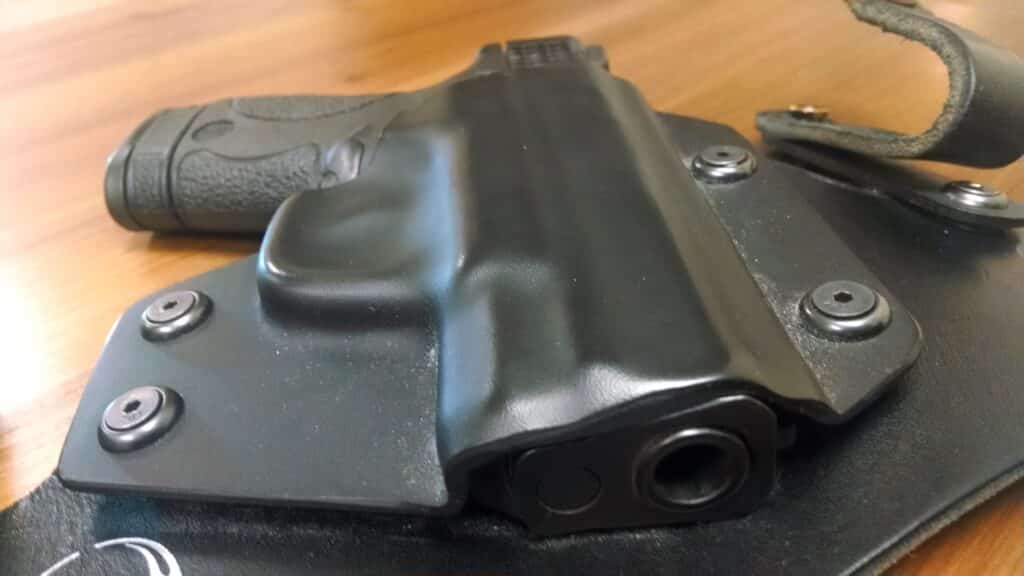
Analysis: How Much are Deep Blue Areas Charging for Carry Permits After Bruen? [Member Exclusive]
By Jake Fogleman
The Supreme Court relegated “may-issue” carry permit systems to the dustbins of history, but that doesn’t mean affected states are rolling out the red carpet to prospective gun-toting residents.
States like New York and New Jersey have captured headlines for revolting against the decision by replacing their old systems with new labyrinthian application requirements and location-based prohibitions on lawful carry. But that’s not the only way governments have acted to put up roadblocks to public carry. Some have determined that by levying exorbitant fees on obtaining a license, they might be able to dissuade the exercise of a constitutional right.
Last week, the city of La Verne, California, finally unveiled its application process for residents wishing to obtain a Carry Concealed Weapon (CCW) license, nearly nine months after the Supreme Court’s decision in New York State Rifle and Pistol Association v. Bruen. If the delayed rollout wasn’t enough, the city has decided to further dissuade its residents from carrying by charging nearly $1,100 for all first-time applicants.
The breakdown of fees is listed on the local police department’s website as $398 for “processing,” a $150 administrative fee, a $93 licensing fee, $20 for fingerprint scanning, $150 for a department-approved psychological review, a $250 estimated cost for an approved safety and training course, and a $20 fee for the physical CCW card. All in, the city’s residents would have to fork over $1,081 just to carry a firearm in public for self-defense.
The city’s cost structure is certainly punitive. Still, it’s just a single example in one of the half-dozen states that have been forced to accept that regular citizens must now be provided an opportunity to carry if they so desire. Its pricey permitting gambit raises the question of whether other jurisdictions are pursuing a similar strategy to try and resist public carry.
Here’s a rundown of where affected states have chosen to stand with regard to permitting fees following the Bruen decision.
New York
Despite taking an antagonistic approach to the Supreme Court’s ruling with its replacement carry law, the Empire State left much of its guidance on permitting costs unchanged. That’s because the state provides wide latitude and discretion to local licensing agencies on how much they can charge for issuing licenses to carry to their residents.
In fact, I was unable to find a minimum fee requirement anywhere in state statute. As a result, the costs to acquire a carry permit vary widely for residents of New York, depending on where they live.
New York City residents face some of the steepest costs to apply. The NYPD charges $340 for the initial application fee and for renewals, which are required every three years. Additionally, the city charges applicants $88.25 for its fingerprinting/background check fee. Applicants will also be required to cover the cost of meeting the required 18-hour training course from a department-approved trainer, which can cost hundreds of dollars itself.
By contrast, upstate Onondaga County simply charges $3 for its application processing fee, in addition to the cost of completing the required training and background check.
New Jersey
Unlike New York, the Garden State chose to ratchet up its concealed carry permit fees in its version of a Bruen-response bill.
State law now stipulates a $200 application fee, a $20 fee to run a criminal history check, a $50 fee to actually receive the permit, plus the cost incurred to meet the state police-approved training course requirement. Local issuing agencies appear to be granted some discretion to charge their own fees. The Trenton Police Department website, for example, lists its own $50 application fee.
Additionally, beginning later this year, carry permit holders must “maintain liability insurance coverage insuring against loss resulting from liability imposed by law for bodily injury, death, and property damage sustained by any person arising out of the ownership, maintenance, operation, or use of a firearm carried in public.”
The law further stipulates that the minimum coverage required is a $300,000 policy to account for “injury to or death of more than one person and for damage to property, in any one incident.”
Because such a policy does not yet exist, and may never exist, the additional costs to comply are still to be determined.
California
The Golden State offers a mix of state guidance and local discretion regarding concealed carry permitting costs.
State law establishes a floor of $44 to be delivered to the state by the local licensing authority, and it caps the fee local authorities can charge for the permit itself at $120. It also grants discretion for local licensing authorities to require a psychological evaluation, but it caps the cost of that evaluation at $150. State law also limits the cost of renewals, which must occur every two years, between $25 and $100.
Other costs—including those incurred to meet the state’s 16-hour training requirement and for fingerprinting—can vary by locality. As a result, you can end up with a city like La Verne that chooses to abuse its discretion by charging exorbitant fees to issue permits.
Meanwhile, according to some estimates, the average all-in cost to obtain a license statewide is around $300-$400. However, since the state is currently considering its own version of a New York-style Bruen-response bill, it’s entirely possible that California lawmakers will add new fees for permit applicants.
Hawaii
License-to-carry applicants in Hawaii are currently subject to a $10 application fee under state statute. The licenses are valid for only one year, and renewals are subject to the same $10 fee. Additional fees from the applicant’s local licensing agency may also apply. For example, Honolulu charges a $43.25 background check fee. Applicants must also cover the cost of completing a government-approved 8-16 hour training course.
Maryland
Maryland’s “Wear and Carry” permit application is handled through an online portal run by the Maryland State Police. The state police currently charge a flat $75 application fee, plus a fingerprinting and background check fee that can run up to around $50. The state also requires applicants to complete an approved safety and training course, which typically costs “anywhere from $250 to $400 and up,” according to the group Maryland Shall Issue. Renewals cost $50 and must be done every two years.
Massachusetts
Massachusetts levies a $100 application fee for first-time applicants and renewals under the age of 70 (over 70 is free). The fee structure is established in state statute, though local issuing authorities may have separate fees for fingerprinting and background checks. License-to-Carry applicants must also pay for and complete a firearms training course certified by the state police. The permits are valid for six years.
Comparison to Other States
Most other “shall-issue” states tend to charge somewhere around $50-$100 for carry permits, with some discretion for local fees and the additional cost to complete any training requirements.
State law in Colorado, for example, caps the cost at $52.50 but allows local licensing agencies to charge up to $100 on top of the state fee for processing, fingerprinting, and background check. The permit is valid for five years, and it can be renewed for a cost of $63 total. That fee structure has remained the law since 2003, despite the state’s current deep-blue political tilt.
Florida, one of the longest-standing shall-issue states, establishes a state fee structure that charges $42 for fingerprint processing, $55 for the licensing fee, and allows local issuing agencies to charge a maximum of $22 on top of that. The Florida permit is valid for seven years and costs $45 to renew.
Meanwhile, other states like Indiana offer residents the opportunity to pay a one-time $125 fee, which includes both state and local costs, for a lifetime carry permit. And that is to say nothing of the other option its residents have, much like those of 24 other states, which is to carry for free under the state’s permitless carry regime.
In other words, gun carriers in the former may-issue states are getting a raw deal when it comes to permitting cost compared with those in shall-issue, and especially permitless, states. Even the states with relatively modest fee requirements, like Hawaii and Maryland, impose such short lifespans on their permits that the costs still add up over time due to the necessity of frequent renewals.
Only Massachusetts, with its fixed fee requirement and six-year permits, offers a comparable option to most other shall-issue states.
So, while the application costs unveiled by the city of La Verne might be the most egregious outlier, it seems most of the other former may-issue jurisdictions are out of step with the rest of the country on permitting costs as well.
That’s it for now.
I’ll talk to you all again soon.
Thanks,
Stephen Gutowski
Founder
The Reload




